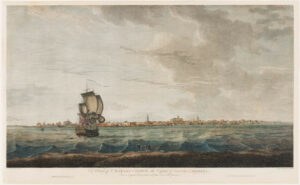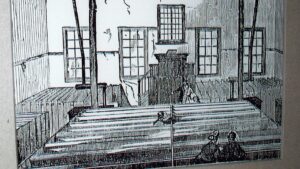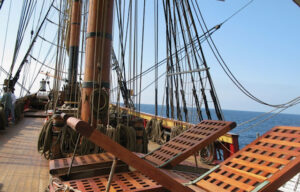Americanism Redux
October 18, 250 years ago today
He shook his head. So disappointing. To be within sight of the place we’ve dreamed of, our destination and the life we want. It’s just right out there, the beautiful shoreline. But we can’t go. The officials here won’t allow it. The brutes just told him that, in tones and manner he’d seen far too often back in a corner of Ireland, the homeland.
So we’re stuck. Today.
How will he tell them? They left all the bad stuff behind. Everything awful. They followed me, one by one, family by family, to come here for a new and better life. And now he has to tell them to wait, sit down or lay down or fall down, we’re staying on this ship until those same power-gripping officials row back out here into Charleston harbor and tell us we can come ashore. This tiny ship of ours, the James and Mary, is our prison.
You could understand if he might have cursed, might have frosted the salt air with a blue-streak of GD here, SOB there, and F them everywhere. But William Martin is not a cursing man. He’s a Christian minister, he’s Reverend Martin, and he’s preparing to tell the men, women, and children huddled aboard the James and Mary that smallpox had been rumored or reported (you pick) on this vessel and that the rumor or report (you keep picking) had reached colonial port officials of Charleston, South Carolina. Now Martin and his people will be confined on the ship for nearly eight weeks, floating on harbor waters in quarantine protocol.
Martin thinks for several minutes about what he’ll say. He holds his Bible, opens it, flips pages, reads passages, thinks some more. Eyes closing, he prays. Heart beating, breath in and out, a creating and a receiving occur in his mind. He’ll share a story of Paradise sought, Paradise delayed, Paradise, ultimately, found.
A tough first day waiting on the salt water outside the Promised Land. Only fifty-one more yet to go.
Below, in the hold, there is coughing. Today, 250 years ago.
Also
Martin and his shipmates have left Londonderry, Ireland because of religious persecution. The Church of England—the Anglican Church—treats he and his congregation harshly as believers in the Presbyterian sect of the Christian faith. Jail them, prosecute them, harass them, belittle them as second-class people in an upper-class society. So they left and came to British colonies in the Carolinas, where many of their brethren from Ireland, Scotland, and England had landed before them. They’ll want nothing to do with anything and anyone smacking of British power and British control. Once in Charleston, they’ll scatter inland, getting away as fast as possible from the coastal community that to a great degree mimics some of the habits of London.
A Presbyterian church in Londonderry, Ireland
America on this day 250 years ago has a place in the eyes of many people. They see it as apart from where they were. It is separate and distant. An uprooting happened, a difficult journey followed, and a combination of replanting, re-rooting, and reinsertion began. For some people this was a story embraced, for others a story imposed, for all of them it is a story where the moisture of ocean water soaks their skin. Whether in their present or not-so-distant past, every person here who isn’t part of a Native tribe has this view of America in their sight, their eyes swollen with tears.
For You Now
Founding is an action of many parts and multiple sources. To found is not to do a single thing one time. Maybe we assume it’s like a birth, which in ways founding does resemble, with a particular episode of life’s arrival and appearance. Big push, sharp pain, loud yells; then none and aging begins. Yes, a declaration or announcement of founding is one moment whose end starts the measurement of duration.
But there are a lot of foundings that can blend together. Think about the people waiting on the James and Mary. They’re founding, too, or are trying to do so. However, when exactly was it? At the time they decided to leave? At the time of leaving? At the time of arriving? At the time when they leave again from the town of Charleston? At the time when an individual person realizes that this is now my new inland home? At the point where the next baby is born or the next corpse is buried?
The knowledge that a founding occurs for each person on that ship should take you to a second thought. When the American Founding occurs, it will be the second founding for the people who, for a while, sailed together on the James and Mary. Two foundings, not one. And a word will need to be chosen that best fits that fact—combine, coincide, collide, join, converge, diverge, overlap, harmonize, blend, or something else. Each person will have their own word.
I think it would be revealing to know how the separate words look as a collective. Can you and I see a pattern in the words collectively? A theme of sorts?
An answer exists in the past, though it will elude us, undiscoverable as history. Gone in the deep.
But we can know this—that foundings are plural and multiplex, and their manifold qualities will interact. To look at a founding and see a singular is a mistake. To build from a narrow singularity robs the founding of its true breadth and strength, shrinking a land of promise into a promised land.
Suggestion
Think about standing on the deck of the James and Mary and looking ashore. See the sight? It’s moving, isn’t it? Be sure to remember that what’s actually moving is you as viewer, not the land as view. Do you see a vision beyond the view?










